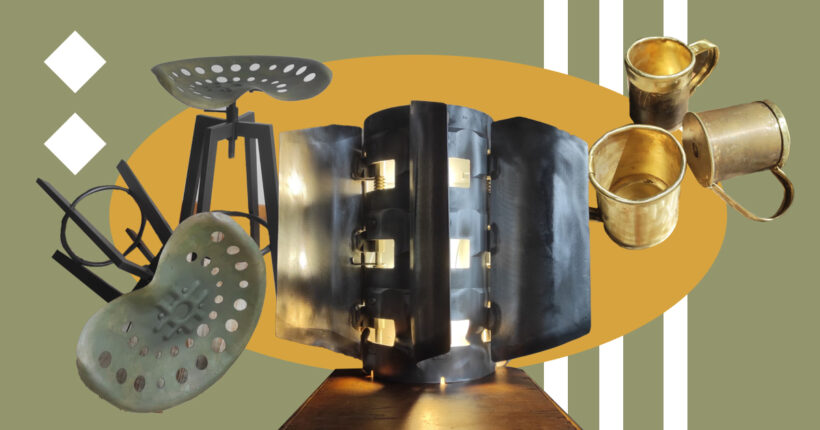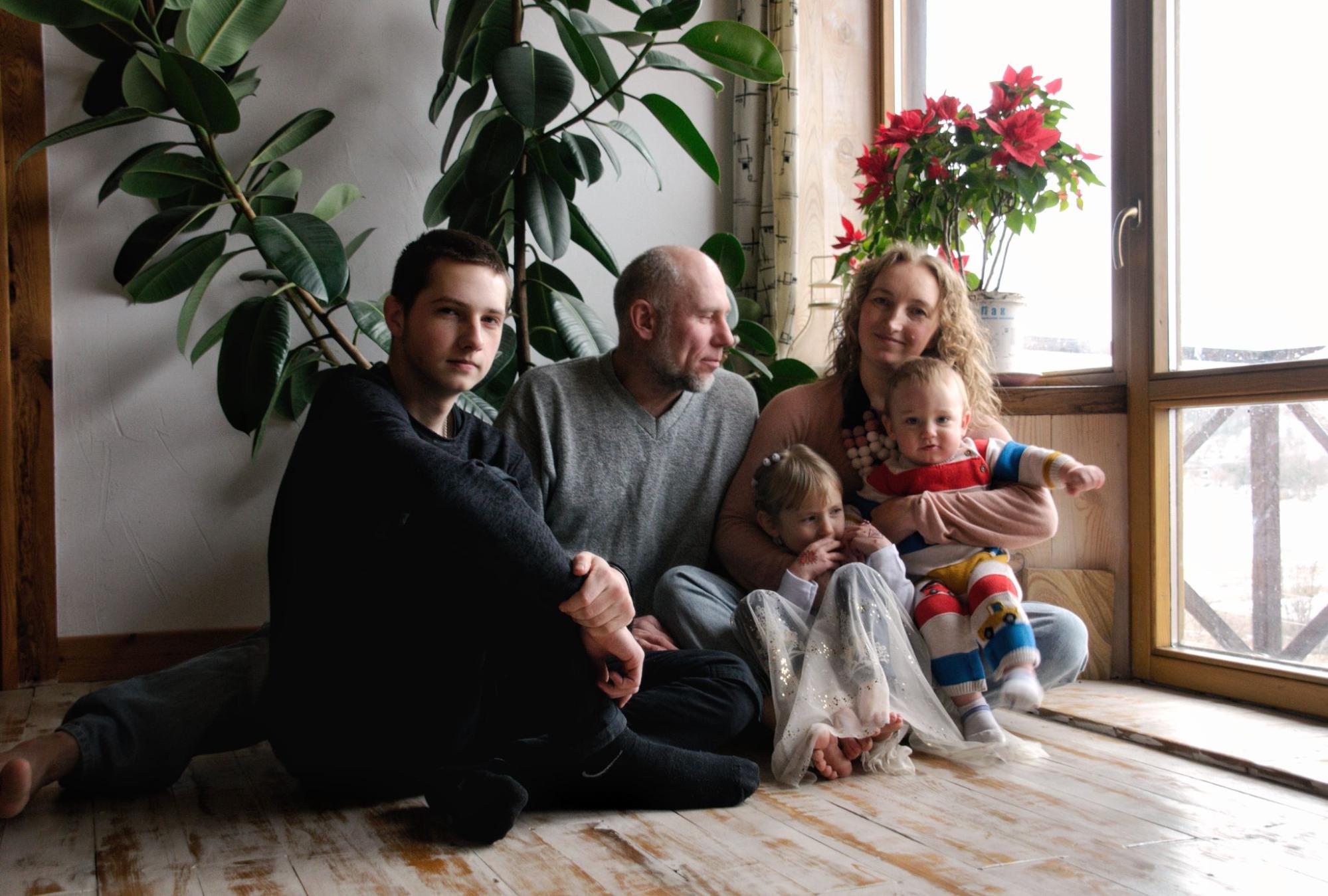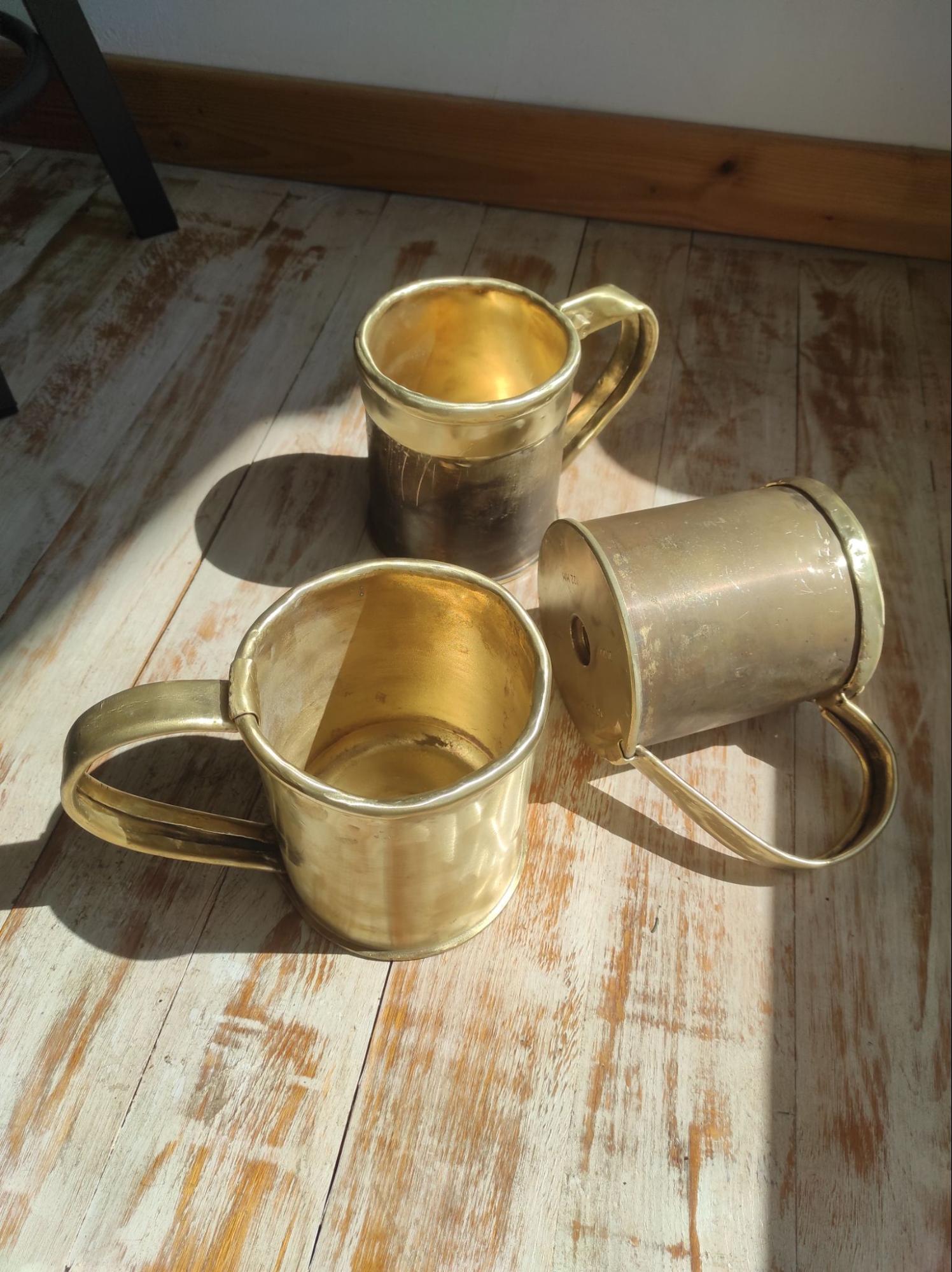
Is it difficult to make Good out of Evil? Is it difficult to process military waste? Rubryka explains.
On the eve of Russia's invasion
Mariia and Stas Zakabluk live in the village of Yakovlivka in the Kharkiv region. The couple has been creative all their lives: Stas has been creating rings from various materials, and Mariia has been creating rope products for about ten years. The family already had three children when, in 2021, Maria suddenly found out that she was pregnant.
"It was so unexpected for me in general. The name Myr, which translates as 'peace' in Ukrainian, immediately came to mind if it's a boy. If it's a girl, it's Mira," says Maria Zakabluk.

The family of Mariia and Stas Zakabluks. Photo from the family archive
According to the plan, Mariia was supposed to give birth in the first half of March. Before the full-scale invasion, the Zakabluk family did not have diapers or other things necessary for the baby at home. They thought that there would be enough time for preparation. However, little Myroslav was born on February 25, 2022.
"I planned to give birth at home with my husband. A premature birth on the second day of the war was probably a combination of factors, despite me being quite calm. In principle, the baby was born full-term by all indications. He probably had to be born on February 25, 2022," says Zakabluk.
At first, the family was going to stay with the baby in their native village, but on the evening of March 2, the enemy carried out an air raid on Yakovlivka. The Zakabluks were lucky that their house was on the outskirts, so it was not damaged. The next day, the family and other relatives who left Kharkiv went to a more peaceful region.
They returned home only after almost three months later — at the end of spring.
What is the problem?
From the beginning of the full-scale invasion, the Zakabluk family actively helped their acquaintances and friends at the front.
"My husband had many friends who served, and acquaintances also organized a fund we supported. Stas unloaded trucks with humanitarian aid and delivered food. He helped as much as he could," says Maria.
The couple, collecting funds from friends, covered all their needs. But they did not decrease — the number of requests only grew.
"Questions constantly arose that something else was needed. Stas was looking for money and things from volunteers and acquaintances. If they didn't have it, we asked their friends for help," Mariia recalls.
The birth of the solution
After returning home to the village, they were taking a walk, and suddenly, Stas saw part of the ammunition from the Uragan rocket launcher. "Look, what a cool thing. I want to make a lamp out of it," Stas took it upon himself. Somehow, he sawed off the tail, which was so heavy, and cut it in half and made lamps.

Lamp made from the Uragan rocket launcher. Photo from the family archive
It was possible to make two lamps from the Uragan rocket launcher, and Stas showed his finished products to his military friends, who immediately offered tubes from the Fagot anti-tank missile system for future lamps.
Then Zakabluk's military friends brought the seats from the anti-aircraft installation. At first, Stas offered to create an ergonomic chair, but Mariia objected because it's not the same without a back, so she offered to make a pair of bar stools.
Over time, the Zakabluk family accumulated some recycled military items at home: several lamps, chairs, and jugs made of shell casings. One day, Stas was thinking about how to complete another request and suggested to his wife that they sell their products. Mariia had an idea to launch a separate charity project. She made an Instagram page filled with photos and videos of her husband's products.

Bar stools made of anti-aircraft material. Photo from the family archive
"We made this project to specifically accumulate money for the needs of the military," Mariia says.
The project's name was taken from the book "Picnic on the Roadside" — a quote by Robert Penn Warren: "You have to make good out of evil because there is nothing else to make out of it."
"This is my husband's favorite book phrase. It speaks for itself as if characterizing our project. You have to make good out of evil — create something useful from things that are already military waste," says Mariia.
How does this solution work?
Mariia manages the project's Instagram page and all communications for Good out of Evil. Stas creates products from what is handed over by the military. A part is sold, and the funds are sent to help the army; the rest is free if the defenders themselves ask to create something.
"The military asks for our products as souvenirs to celebrate people joining fundraisers or for auctions. Of course, we do not take money from defenders," the Zakabluks told Rubryka.

Mugs made by Stas. Photo from the family archive
The Zakabluk family managed to collect about ₴30,000 for the products. The couple does not know how much money the military received from the use of Good from Evil products.
The military themselves provide the material. They ask if Stas can do something from what is left after the hostilities.
"The range expands depending on what comes to us. For example, products for five thousand hryvnia were made from one cartridge case, allowing the couple to buy a windshield for the car. Diesel heaters were recently delivered because the military says it's already cold enough outside; there's nothing to keep them warm, and this is the only thing that doesn't show up on the thermal imager. It is not visible, so detecting where Ukrainian soldiers are located is impossible," says Mariia.
Each product takes a different amount of time to create. It may take a long time for Stas to come up with a recycling idea. "Even if you know what you want to do, the question arises: how you want to do it," says Zakabluk. Sometimes, it is also necessary to purchase additional components — light bulbs or cables. Further, each product has its own way of creation. For example, in order to make something out of a sleeve, first, the metal should be made soft. Stas makes a fire at home and puts metal in it.

Plate from Good out of Evil. Photo from the family archive
In this way, the metal is softened and can be bent to give it some shape. "Stas likes to work with brass because he used to make rings with it," says Mariia.
Sometimes, the soldiers order gifts for the command or souvenirs for themselves.
How to support the solution?
You can order something for yourself to support the Good out of Evil project. From the received funds, the Zakabluks will cover certain needs of the defenders.
"There are two lamps from the very first Uragan. There is a small jug and one plate — the mugs are all reserved. The more people know, the better. We will also be grateful for going to auctions to exhibit our products there," says Mariia.
She sees Good out of Evil as a long-term project because there will still be plenty of military waste even when the war ends.
"There are a lot of remnants of shells and equipment. They can be garbage, or they can be something useful. We are interested in making it useful. If there are no needs and no military requests, then for many years, there will be a request for the rehabilitation of the military. Then all the money will go to that," concludes Mariia.
Check out the project's Instagram page Good out of Evil.

First symbolic, then real rebuilding: how the Ukrainian Puzzles initiative helps Ukraine's reconstruction

From a large production workshop to a small bakery: how a family from Sievierodonetsk continued their own business from scratch






